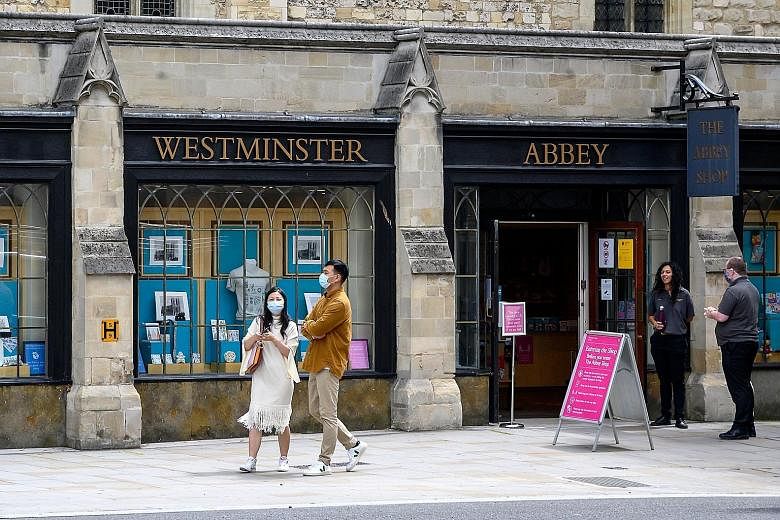LONDON • Face masks will be compulsory in shops and supermarkets in England from next week, the government said yesterday in a U-turn on previous policy.
The new legislation will come into force in England on July 24, after weeks of wrangling from ministers about the effectiveness of masks.
Prime Minister Boris Johnson's office said: "There is growing evidence that wearing a face covering in an enclosed space helps protect individuals and those around them from coronavirus."
People who fail to cover their face risk a fine of up to £100 (S$174).
Mr Johnson on Monday said the measure was "extra insurance" against the spread of the virus.
"I do think in shops it's very important to wear a face covering if you're going to be in a confined space to protect other people, and receive protection," he said.
Face masks have been mandatory on public transport across the country since June 15, and Scotland has already made the coverings compulsory for shoppers.
British Environment Secretary George Eustice said yesterday that the government was changing its advice in accordance with developments in scientific thinking.
"The evidence, the understanding, has been evolving," he told Sky News television. "I don't think it's unreasonable to ask the public now to go to that next step."
Health Secretary Matt Hancock was due to outline the new policy in Parliament later in the day.
But there are already concerns from the police who have called it "nigh on enforceable".
"Shopkeepers need to step up to the plate and take some responsibility," said Mr Ken Marsh of the Metropolitan Police Federation, which represents rank-and-file officers.
"They can quite easily put signs up on their doors - 'No mask on, no entry, this is private property'."
Britain has seen almost 45,000 deaths so far in the first wave - the highest toll in Europe and third only to the United States and Brazil.
The government was also warned yesterday that a second wave of infections could see 120,000 deaths in hospitals alone in a "reasonable worst-case scenario" if no action was taken now.
An Academy of Medical Sciences report, commissioned by the government's chief scientific adviser Patrick Vallance, said the government needed to prepare immediately to prevent the state-run National Health Service from being overwhelmed from September.
With hospitals also battling seasonal flu cases, a second wave could eclipse the current outbreak, resulting in up to 120,000 deaths between September and June next year, according to the study.
The modelling does not include deaths in care homes or the wider community, and assumes no government action to prevent a fresh surge in cases.
The latest predictions are based on an assumption that the R rate - which measures how many people an infected person is expected to infect - rises to 1.7 from September.
The R rate is currently between 0.7 and 0.9 across the whole country, according to the latest government figure published last Friday.
Professor Stephen Holgate, who led the study, said the 120,000 figure was "not a prediction but it is a possibility". "The modelling suggests that deaths could be higher with a new wave of Covid-19 this winter, but the risk of this happening could be reduced if we take action immediately."
The report calls for "intense preparation" this month and next to minimise community transmission, a public information campaign and ensuring enough protective equipment for front-line medical and social care staff.
The government's test, trace and isolate programme also had to be scaled up, along with surveillance and ensuring at-risk individuals, and healthcare and care workers get flu jabs.
Stay-at-home restrictions in Britain are now being eased in a bid to kick-start the country's stalled economy but there remains concern about rising numbers of cases in some areas.
Mr Johnson said last Friday he was in favour of localised responses to outbreaks rather than again having to order the whole country to be shut down.
AGENCE FRANCE-PRESSE











